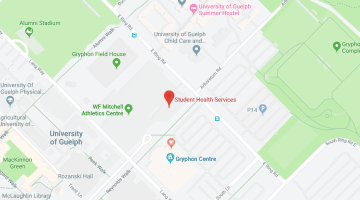The following training programs are available for current University of Guelph students, staff, and faculty. Students can see currently available training opportunities on GryphLife [1], and Faculty and Staff should check the Learning & Development event calendar [2].
Looking for a training for your team or department? Email mentalhealth.training@uoguelph.ca [3] to book a training or discuss which option is suitable for your group.
Upcoming Trainings:
- Trauma-informed Care - Open Call for Staff & Faculty
- Additional dates for the Winter semester will be added soon.
- If you are unable to attend the current session and are interested in hearing about future opportunities, please email mentalhealth.training@uoguelph.ca [4]to be added to the list.
- Beyond the Books: Mental Health Literacy Training
- If you are interested in having a Beyond the Books training facilitated in your class, for a student run on-campus group/club/association, for a student staff team or for a staff/faculty team, please email mentalhealth.training@uoguelph.ca [5]to be added to the list.
- safeTALK Suicide Prevention Training
- Thursday, February 26th, 2026 (1:00pm - 4:30pm on campus) - Register here [6].
- If you are unable to attend the current sessions and are interested in hearing about future opportunities, please email mentalhealth.training@uoguelph.ca [4]to be added to the list
- Applied Suicide Intervention Skills Training (ASIST)
- Tuesday, February 17th, 2026 and Wednesday, February 18th, 2026 (8:30am - 4:30pm both days on campus)
- Register here [7].
- If you are unable to attend the current sessions and are interested in hearing about future opportunities, please email mentalhealth.training@uoguelph.ca [4]to be added to the list.
- Mental Health First Aid
- Wednesday, March 11, 2026 and Wednesday, March 18, 2026 (9:00am - 4:30pm both days on campus) - Registration is now open.
- Register here [8].
- For this training, we are prioritizing staff and faculty registrations.
- If you are unable to attend the current sessions and are interested in hearing about future opportunities, please email mentalhealth.training@uoguelph.ca [4]to be added to the list.
More Feet on the Ground
More Feet on the Ground is an educational website on how to recognize, respond and refer students experiencing mental health issues on campus.
Recommended for: All members of the University community, including students, staff and faculty.
Registration: Complete the online module independently at morefeetontheground.ca [9]
Cost: None
Length: Less than 30 minutes
Beyond the Books
Beyond the Books is a face-to-face session that will first provide participants with general information on the prevalence of mental challenges and illness. It will then help participants to identify signs of troubling behaviour and give them skills to engage in a preliminary discussion to determine if referral to a professional is necessary. Participants will also learn how and where to refer appropriately in a compassionate and effective manner. This session is designed for individuals who do not have ongoing relationships with individuals but whose roles are such that they may have one-off, in-depth conversations.
Registration: Email mentalhealth.training@uoguelph.ca
Trauma-Informed Care: Connecting with Compassion
This two-hour, in-person training is designed to help all staff and faculty increase their knowledge and awareness about trauma and its impacts. The training provides strategies for implementing the Six Principles of Trauma-Informed Care, including self-regulation and self-care practices, to improve competency in working with and supporting students who have experienced trauma.
This training consists of four modules; 1) Realizing the prevalence of trauma, 2) Recognizing the effects of trauma, 3) Responding: From knowledge to practice, and 4) Self-Regulation and self-care practices.
Recommended for: Any staff and faculty who interact with students, whether formally (such as Instructors, Adminstrative Assistants, those in 1-1 advising/support roles, etc.) or informally (such as Hospitality Staff, Custodians, etc.). This training is not currently offered to students.
Registration: Email mentalhealth.training@uoguelph.ca [10] to book a personalized session for your department or team.
Cost: None
Length: 2 Hours
LivingWorks Start
LivingWorks Start is an online alertness training that prepares anyone, regardless of prior experience or training, to recognize when someone is thinking about suicide and connect them to help and support.
Recommended for: Individuals who are not mental health experts but who might have on-going relationships with people who have mental health issues and/or where the individual is in a position of authority. Examples might include: Faculty Advisors and Graduate Assistants, Chairs/Directors, Deans, Supervisors, RAs, varsity coaches, Program Counsellors, Union/employee group leaders, individuals involved in Human Resources, and Faculty and Academic Staff Relations. All U of G Students, staff and faculty are welcome to participate!
Registration: Email mentalhealth.training@uoguelph.ca to request access
Cost: None
Length: 1.5 hours
safeTALK
Designed by Living Works, safeTALK is a 3.5 hours alertness training and certification that prepares anyone, regardless of prior experience or training, to become a suicide-alert helper. The safeTALK trainer will demonstrate the importance of suicide alertness, assist participants to identify ways people invite help, and connect them with resources to help them when they are at risk.
Beyond the Books - Level 2
Mental Health First Aid
Applied Suicide Intervention Skills Training (ASIST)
Developed by Living Works, ASIST is a two-day interactive workshop that teaches participants to recognize when someone may have thoughts of suicide and work with them to create a plan that will support their immediate safety.
Mental Health Module Series [11]
This series of online mental health modules is freely accessible, and aims to improve students' education on a number of topics related to mental health and mental illness.
These trainings are offered through the Student Mental Health Network [12].
